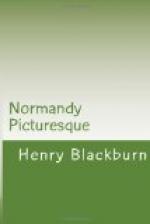On this beautiful winding road, which is carried along and between, the ridge of hills on which Avranches stands, and commands views westward over the bay to Mont St. Michael and eastward towards Alencon and the plains of Orne, we only meet one or two solitary pedestrians. We are nearly as much alone as in a Swiss pass; the scenery might be part of the Tete Noire, and the Hotel de la Poste, at Mortain, which is built on the side of a hill over a ravine, and at which our diligence makes a dead stop, might, for many reasons, be a posada on the Italian Alps.
If we stroll out at once, before the evening closes, we shall have time to visit the cemetery on the rocks, to see the remains of a castle of the Norman dukes, and above all, the superb panorama from the heights; and we may wander afterwards into the valleys to see the cascades, the ivy-covered rocks, and the masses of ferns; scenes so exquisite and varied that we are lost in wonder that all these things are to be seen in France at small trouble and cost, and that French artists have hardly ever told us of them.[34]
That ‘the country round Mortain is not known as well as it deserves,’ is a remark that cannot be too often repeated; we cannot, indeed, imagine a more delightful district for an English artist in which to spend a summer, and we promise him that he shall find subjects that will look as well on the walls of the Academy as the Welsh hills, or the valleys of Switzerland.
We are at a loss to express in words the romantic beauty of the situation of Mortain, where we may pitch our tent, and make studies of rocks, which will tell us more in practice, than written volumes about these wondrous geological formations; and the clusters of ivy in the niches, the moss and lichen, the rich colour of the boulders, the trees in the valleys below us, the clear sky, and the sweet air that comes across the bay, make us linger here for the beauty of the scene alone; regardless almost of the ancient history of Mortain, of the story of its Pagan temples, of its thirteenth-century church, and almost unmindful of the ‘Abbaye de Savigny,’ eight miles off, a building which is worthy of a special visit.
And we come away, perforce, in the evening-time from all this lovely landscape, from the pure air, from the cascades, the rocks, and the ferns, from everything agreeable to the senses, to the most literal, shameful, wallowing in the mire. We have spoken, so far, only of the scene; let add a word in very truth, about ‘man and his dwelling-place.’ How shall we describe it? We are at the Hotel de la Poste, and we are housed like pigs; we (some of us) eat like them, and live even as the lower animals. We—’Messieurs et Mesdames,’ lords and ladies of the creation—hide our heads in a kennel; our dirty rooms ‘give’ on to the odorous court-yard; we turn our backs upon the valley which the building almost overhangs; we can neither breathe pure air nor see the bright landscape. Any details of the domestic arrangements and surroundings of the Hotel de la Poste at Mortain would be unfit for these pages; suffice it that, we are in one of the second-rate old-fashioned inns of France, the style of which our travelled forefathers may well remember.[35]




